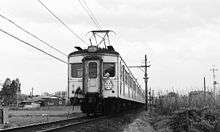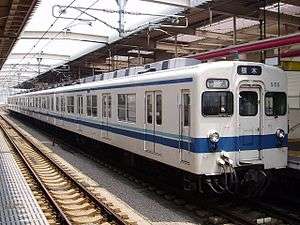Tobu Ogose Line
The Tobu Ogose Line (東武越生線, Tōbu Ogose-sen) is a 10.9 km mostly single-track branchline in Saitama Prefecture, Japan, operated by the private railway operator Tobu Railway. It runs from Sakado Station on the Tobu Tojo Line to Ogose Station, connecting with the JR East Hachikō Line.[1]
| Tobu Ogose Line | ||||||||||||||||||||||||||||||||||||||||||||||||||||||||||||||||||||||||||||||||||||||||||||||||||||||||||||||
|---|---|---|---|---|---|---|---|---|---|---|---|---|---|---|---|---|---|---|---|---|---|---|---|---|---|---|---|---|---|---|---|---|---|---|---|---|---|---|---|---|---|---|---|---|---|---|---|---|---|---|---|---|---|---|---|---|---|---|---|---|---|---|---|---|---|---|---|---|---|---|---|---|---|---|---|---|---|---|---|---|---|---|---|---|---|---|---|---|---|---|---|---|---|---|---|---|---|---|---|---|---|---|---|---|---|---|---|---|---|---|
An Ogose Line 8000 series EMU at Sakado station in September 2006 | ||||||||||||||||||||||||||||||||||||||||||||||||||||||||||||||||||||||||||||||||||||||||||||||||||||||||||||||
| Overview | ||||||||||||||||||||||||||||||||||||||||||||||||||||||||||||||||||||||||||||||||||||||||||||||||||||||||||||||
| Native name | 東武越生線 | |||||||||||||||||||||||||||||||||||||||||||||||||||||||||||||||||||||||||||||||||||||||||||||||||||||||||||||
| Type | Commuter rail | |||||||||||||||||||||||||||||||||||||||||||||||||||||||||||||||||||||||||||||||||||||||||||||||||||||||||||||
| Locale | Saitama Prefecture | |||||||||||||||||||||||||||||||||||||||||||||||||||||||||||||||||||||||||||||||||||||||||||||||||||||||||||||
| Termini | Sakado Ogose | |||||||||||||||||||||||||||||||||||||||||||||||||||||||||||||||||||||||||||||||||||||||||||||||||||||||||||||
| Stations | 8 | |||||||||||||||||||||||||||||||||||||||||||||||||||||||||||||||||||||||||||||||||||||||||||||||||||||||||||||
| Operation | ||||||||||||||||||||||||||||||||||||||||||||||||||||||||||||||||||||||||||||||||||||||||||||||||||||||||||||||
| Opened | 17 February 1932 | |||||||||||||||||||||||||||||||||||||||||||||||||||||||||||||||||||||||||||||||||||||||||||||||||||||||||||||
| Owner | Tobu Railway | |||||||||||||||||||||||||||||||||||||||||||||||||||||||||||||||||||||||||||||||||||||||||||||||||||||||||||||
| Depot(s) | None | |||||||||||||||||||||||||||||||||||||||||||||||||||||||||||||||||||||||||||||||||||||||||||||||||||||||||||||
| Rolling stock | Tobu 8000 series | |||||||||||||||||||||||||||||||||||||||||||||||||||||||||||||||||||||||||||||||||||||||||||||||||||||||||||||
| Technical | ||||||||||||||||||||||||||||||||||||||||||||||||||||||||||||||||||||||||||||||||||||||||||||||||||||||||||||||
| Line length | 10.9 km (6.8 mi) | |||||||||||||||||||||||||||||||||||||||||||||||||||||||||||||||||||||||||||||||||||||||||||||||||||||||||||||
| Number of tracks | Single | |||||||||||||||||||||||||||||||||||||||||||||||||||||||||||||||||||||||||||||||||||||||||||||||||||||||||||||
| Track gauge | 1,067 mm (3 ft 6 in) | |||||||||||||||||||||||||||||||||||||||||||||||||||||||||||||||||||||||||||||||||||||||||||||||||||||||||||||
| Minimum radius | 205 m | |||||||||||||||||||||||||||||||||||||||||||||||||||||||||||||||||||||||||||||||||||||||||||||||||||||||||||||
| Electrification | 1,500 V DC, overhead catenary | |||||||||||||||||||||||||||||||||||||||||||||||||||||||||||||||||||||||||||||||||||||||||||||||||||||||||||||
| Operating speed | 90 km/h (55 mph)[1] | |||||||||||||||||||||||||||||||||||||||||||||||||||||||||||||||||||||||||||||||||||||||||||||||||||||||||||||
| ||||||||||||||||||||||||||||||||||||||||||||||||||||||||||||||||||||||||||||||||||||||||||||||||||||||||||||||
Service outline
Service consists of four trains per hour in each direction during the daytime, increased to six trains per hour in the morning and evening peak periods.[2] Services are formed of 4-car 8000 series electric multiple unit (EMU) trains.
Stations
All stations are located in Saitama Prefecture.
| No. | Name | Japanese | Distance (km) | Transfers | Location |
|---|---|---|---|---|---|
| TJ26 | Sakado | 坂戸 | 0.0 | Sakado | |
| TJ41 | Ippommatsu | 一本松 | 2.8 | Tsurugashima | |
| TJ42 | Nishi-Ōya | 西大家 | 4.4 | Sakado | |
| TJ43 | Kawakado | 川角 | 5.6 | Moroyama | |
| TJ44 | Bushū-Nagase | 武州長瀬 | 7.6 | ||
| TJ45 | Higashi-Moro | 東毛呂 | 8.6 | ||
| TJ46 | Bushū-Karasawa | 武州唐沢 | 9.4 | Ogose | |
| TJ47 | Ogose | 越生 | 10.9 | ■ Hachikō Line |
Rolling stock
Since June 2008, all Ogose Line services are formed of four-car 8000 series EMU trains. 7300 series EMUs were used up until 1984,[5] 7800 series EMUs were used up until 1985, 5000 series EMUs were used until 1990, and 10030 series and 10050 series EMUs were also used alongside the 8000 series trains until the start of driver-only operation in June 2008.
 7300 series EMU
7300 series EMU 7800 series EMU in April 1977
7800 series EMU in April 1977 5000 series EMU
5000 series EMU- A 10030 series 4-car EMU in July 2004
- A 10050 series 4-car EMU in July 2004
- Refurbished 4-car 8000 series set in May 2008
History
The line first opened as a freight line operated by the Ogose Railway (越生鉄道) between Sakado and the Komagawa River (later Morido Station (森戸駅)) on 17 February 1932.[4] The line was extended from Morido to Ogose on 16 December 1934, from which date passenger services also commenced.[4]
From 1 July 1943, the Ogose Railway was absorbed into the Tobu Railway, and the line was renamed the Tobu Ogose Line.[4] From 1 December 1944, all services on the line were suspended, as the line was considered non-essential as part of the war effort. Services were not resumed until 1 December 1945.[4]
The line was electrified in July 1950 at 1,500 V DC.[1] CTC signalling was commissioned on 1 October 1959, the first use of this system by the Tobu company.[4] Freight services between Nishi-Oya and Ogose ceased on 21 February 1984, and between Sakado and Nishi-Oya on 1 August 1984.[4] On 25 August 1987, the Bushu-Nagase to Higashi-Moro section was double-tracked.[4]
Through trains to and from Ikebukuro and Kawagoeshi on the Tojo Line operated until the 1970s. Between 1996 and 2003, a special direct Ogose Kanbai (越生観梅号) train was operated between Ikebukuro and Ogose on certain weekends in February during the plum blossom viewing season. This train initially ran non-stop from Ikebukuro to Ogose (with a driver change at Sakado), but, in subsequent years, included stops at Asakadai and Kawagoe. From 2004 until 2007, regular scheduled trains on the Ogose Line were decorated with an Ogose Kanbai headboard for one day during March.
The Ogose Line switched to driver-only operation from the start of the revised timetable on 14 June 2008.[4] The start of driver-only operation also involved the installation of platform edge sensors at all stations on the Ogose Line.[6]
From 17 March 2012, station numbering was introduced on all Tobu lines. Tobu Tojo Line and Ogose Line stations were numbered prefixed with the letters "TJ".[7]
Former connecting lines
A freight-only line serving the Nippon Cement works in Hidaka operated from 1963 until 1984, using a spur track which branched off from the line at Nishi-Ōya Junction, to the east of Nishi-Ōya Station.[3][8]
See also
References
- Terada, Hirokazu (July 2002). データブック日本の私鉄 [Databook: Japan's Private Railways]. Japan: Neko Publishing. pp. 57–197. ISBN 4-87366-874-3.
- "Tobu Tojo Line Timetable", published March 2013
- Yajima, Shuichi (1 July 2013). 東武東上線 街と駅の1世紀 [Tobu Tojo Line - A Century of Towns and Stations]. Tokyo, Japan: Sairyusha. p. 74. ISBN 978-4-7791-1722-0.
- 埼玉のローカル線のんびり旅 [Saitama Rural Railway Line Leisurely Trips] (in Japanese). Japan: Mikishobou. 31 July 2013. p. 109. ISBN 978-4-906799-26-8.
- The Railway Pictorial (in Japanese). Japan: Denkisha Kenkyūkai. 58 (799): 187. January 2008. Missing or empty
|title=(help) - "Your Tōjō", May 2008 issue
- 「東武スカイツリーライン」誕生! あわせて駅ナンバリングを導入し、よりわかりやすくご案内します [Tojo Sky Tree Line created! Station numbering to be introduced at same time] (pdf). Tobu News (in Japanese). Tobu Railway. 9 February 2012. Retrieved 18 March 2012.
- Kawashima, Ryozo (February 2011). 日本の鉄道 中部ライン 全線・全駅・全配線 第11巻 埼玉南部・東京多摩北部 [Railways of Japan - Chubu Line - Lines/Stations/Track plans - Vol 11 Southern Saitama and Northern Tama Tokyo]. Japan: Kodansha. p. 68. ISBN 978-4-06-270071-9.
External links
| Wikimedia Commons has media related to Tōbu Ogose Line. |
- Official website (in Japanese)